Across the world and throughout different cultures, people are growing old. How they are integrated into the community and treated by the younger members of society can differ. Here are some of the places where being old will get you much-deserved respect.
Sweden
If only we could all age in Sweden, and that’s not just so our entire homes can be furnished by IKEA. While the Scandinavian country has a reputation for being progressive in general, it’s their respectful treatment of their elderly that’s seriously impressive. A whopping 94% of people over the age of 65 remain in their homes, able to live independently. They’re not having to go it alone though, with access to carers (Sweden has the highest number of health care workers for the elderly) as well as ready-cooked meals delivered to them. Most care is funded via taxes, with each municipality responsible for home assistance funding and housing accessibility.

Korea
Many Asian cultures are embedded with a deep respect for the elderly, which is a core value of Confucianism. In Korea, formal speech (known as ‘jondaemal’, ‘word of respect’) is used when speaking not only with anyone over the age of 65, but anyone even slightly older than the speaker. Elders are also bowed down to as a further show of respect, with the depth of the bow being dependent on the relative seniority. Other Korean customs include turning your head away from the elder when you are drinking with them, and using two hands on receipt of a gift from an older person. Speaking of gifts, 6th and 70th birthdays are huge celebrations, with families gathering to shower attention and presents on their elderly loved ones.

West Africa
The Yoruba people of West Africa mostly live in Nigeria and make up 21% of the country’s population. Elders in this ethnic group are shown great respect through a specific greeting in which the younger person (usually a child) either lies down in front of them if they are male, or kneels with her hands behind her back if she is female—shaking hands or hugging the elder is a big no-no. While elders of both genders are revered, the older women are thought to develop mystical powers.
When women tribe members reach old age, they’re said to be able to access Yoruba deities.

Bolivia
In a report into the quality of life for elders around the globe (conducted in 2013), Bolivia made it into the top 50. That’s an impressive feat for a country which is one of the poorest in Latin America. What Bolivia is doing right for their older citizens is giving them access to free health care and investing in a national plan on aging. They’re also opening the doors to further education, with retirees able to enroll for free in university courses such as IT and legal studies. Less academically inclined students can take classes in origami, yoga and dance. Not only are these mature age students broadening their own knowledge, they’re connecting to the wider community—upon graduation, they share their lessons with peers in nursing homes and hospitals in what’s called ‘dignity brigades’. Other elders are working up a sweat in the sporting arena, with a group of grandmothers and great-grandmothers making up a handball team in El Alto.

Main photo: Alaskan Native women in Kuspuks and parkas. "Our Elders are our living treasures."



